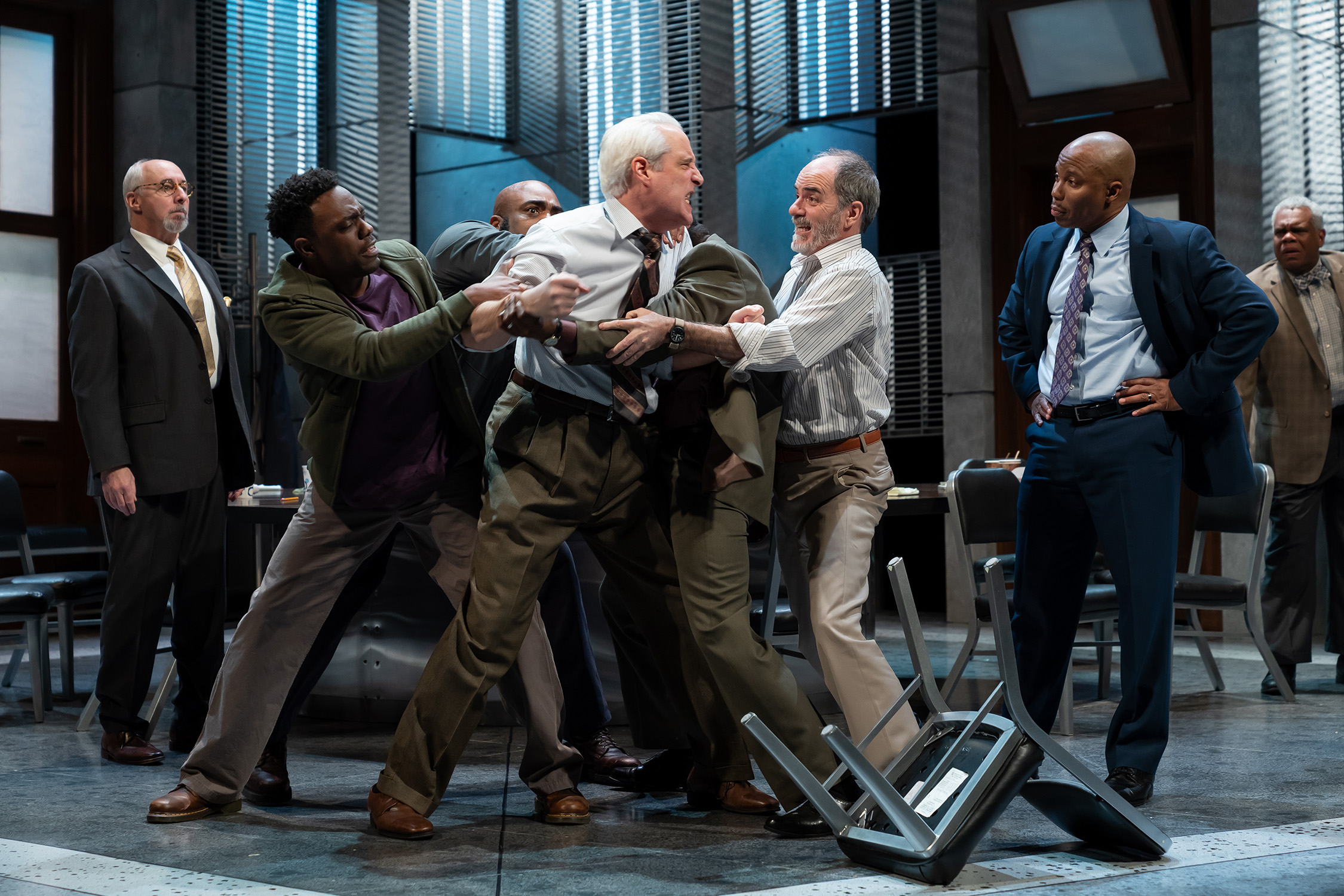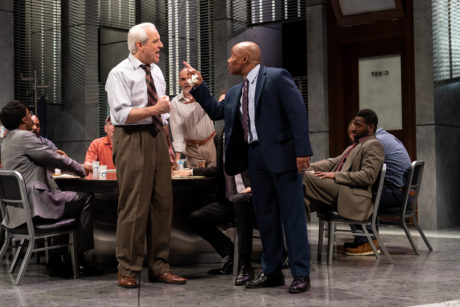Some sixty-five years since its original premiere as a black-and-white teleplay, Reginald Rose’s Twelve Angry Men remains timeless; all too intriguingly relevant as ever. In the Ford’s Theatre production, time has not withered away the dramatic and cultural edges of Twelve Angry Men, especially given current days and ongoing debates on whose life may matter and how juries decide such matters. And with the effective direction, clear vision and fine casting of Sheldon Epps, some inviting new intersections into the play have been located–intersections that will bring new audiences to the venerable Twelve Angry Men.

A quick set-up: Twelve male jurors (in the Ford’s production there are six African American jurors and six white jurors) are called upon to decide the fate of the defendant, an unseen 16-year-old young man of color. The defendant is accused of murdering his father using a switchblade knife. There are witnesses, testimony, and facts. Seems like a quick, easy unanimous verdict. Yet one juror (Erik King as a compelling voice of reason with mannerisms to match) is not so sure that the defendant is guilty beyond a reasonable doubt. This one juror wants time to openly discuss and re-examine the case. “I want to talk for a while” is how he quietly but firmly puts it.
So begin the jury deliberations in a chilly-looking modern decor jury room (Scenic Designer Stephanie Kerley Schwartz). The jurors begin to bicker, then to battle it out, with competing views of the defendant’s guilt or innocence. There are heated words and several physical scuffles. There are refrains: “You think he’s not guilty, I’ve never seen a guiltier man in my life.”
As Twelve Angry Men steams along, even with an intermission, the production has scenes of subtlety and decency, with more scenes that are heated moments full of rawer emotion. Lines are drawn. What is once clear to jurors becomes muddy with re-interpretations of testimony, facts disputed and possible new motives uncovered.
What was once solid is now built on quicksand as the twelve jurors talk and talk and talk, trying to get to a unanimous verdict. But that final verdict is not the reason to see Twelve Angry Men at Ford’s, or anywhere for that matter. It is the journey to the final scene and verdict that is the reason to take in the production.
Under Epps’ direction and the seasoned actors’ prowess, there is the compelling opportunity to get inside each juror’s head–even if as an audience member you have seen many a previous version of Twelve Angry Men, or acted in one or perhaps as some of us, have been on a real-life jury with someone’s life in your hands.
The cast features the already mentioned Erik King along with Bru Ajueyitsi, Christopher Bloch, Eric Hissom, Sean-Maurice Lynch, Brandon McCoy, Jason B. McIntosh, Lawrence Redmond, Michael Russotto, Bueka Uwemedimo, Craig Wallace, Elan Zafir and Paz López. The jurors are identified by numbers, not names. Each has a turn in the spotlight, several more so than others. But each has sufficient time to become an individual either visually through their attire (Wade Laboissonniere’s costume designs) or the way they speak, interact with others, or move about the stage. Some in the cast are restless, others sit quietly. Some represent blue-collar backgrounds, while one works for a bank. One writes ad jingles for a living, while another is a watchmaker. Some jurors can seem rational and others the polar opposite. And some bait; while others take the bait. It is a lifeboat of a jury pool.

What to take away from the admirable Ford’s production of Twelve Angry Men? Here are a few elements that stuck with me:
– There is the forceful pronunciation of the word “they” or “them” when spoken by certain jurors. It has a nasty spit to it especially in lines like: “Well, don’t you know about them (my emphasis) and “I’ve lived among ’em all my life. You can’t believe a word they say. You know that.”
– A line from a juror not born in the USA that brought a hush the evening I saw the production: “This is the reason I came here. I wanted to have the right to disagree.”
– How the votes of guilty or not guilty are tallied up, including the order of who votes guilty or not guilty.
-How each juror responds to the racist vitriol in their midst. It is a wonder of “in the moment” acting.
A classic American drama that has withstood the decades, Twelve Angry Men is becoming America’s version of Shakespearean drama that can be molded and remolded for new generations and new audiences without losing its power to help us locate our better angels. I can imagine any number of combinations of jurors (and even the defendant) that will bring to bear different intersections to enlighten us. Jury nullification anyone? I look forward to any and all.
[Read John Stoltenberg’s Magic Time! column about Twelve Angry Men.]
Running Time: About two hours, with one intermission.
Twelve Angry Men plays through February 17, 2019, at Ford’s Theatre – 511 10th Street, NW, Washington, DC. For tickets, call the box office at (888) 616-0270, or purchase them online.
Lighting Design, Dan Covey; Sound Design, John Gromada




